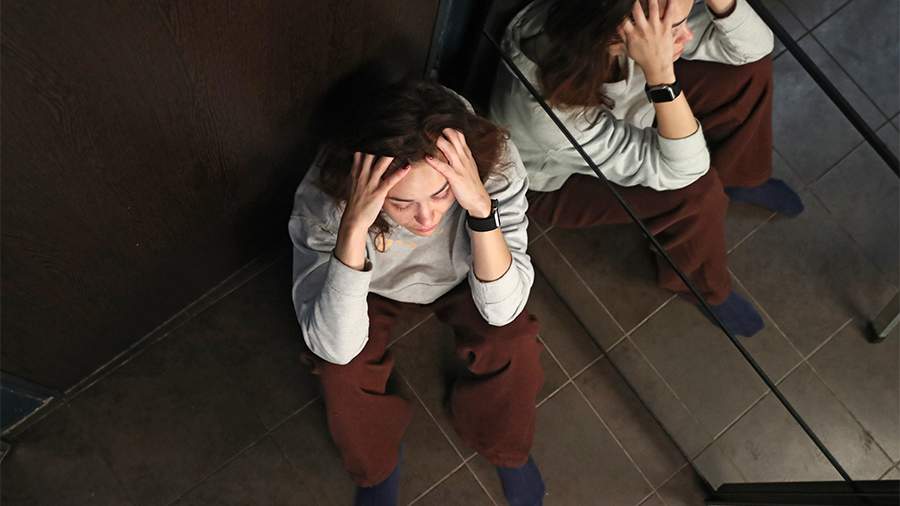Neurologist told about the factors contributing to the development of depression

Depression is not just a "bad mood", but a serious disorder that greatly reduces the standard of living. On January 13, January 13, the World Depression Day, Ekaterina Demyanovskaya, an expert at Hemotest Laboratory, told Izvestia what types of depression exist and what symptoms can be used to identify this disorder in yourself or a loved one.
According to her, depression or depressive disorder is a mental disorder in which a person becomes apathetic, loses interest in life and activities that used to bring him pleasure and joy, feels constantly depressed, sees life in black colors, begins to gain or lose weight sharply, sleeps poorly. In the severe course of depression, it is difficult to do even the most basic household chores.
"The causes of depression are still not accurately studied. In this mental disorder, the production of neurotransmitters dopamine, serotonin and norepinephrine in the brain is disturbed. They are responsible for motivation, pleasure, concentration and are necessary for the exchange of information between nerve cells. Why there is a failure, it is still unclear", - said Demyanovskaya.
At the same time, she specified: it is known that the development of depression contributes to genetic predisposition, chronic stress, poor nutrition, lack of sunlight, organic lesions of the brain.
"Also hormonal fluctuations make their contribution - probably that is why women have recurrent, that is, recurrent depressive disorder is twice as common as men," the expert added.
Depression is categorized into several types. As the doctor explained, there is a depressive episode and recurrent, that is, recurrent depressive disorder. A depressive episode is a single manifestation of depression, and when it recurs, recurrent depressive disorder is diagnosed. Any clinically significant depression is expressed by a clear loss of interest in life, apathy, fatigue, sleep and appetite disorders. A person constantly feels a hopeless boredom, often even just to get out of bed in the morning is a real feat for him.
Depression can occur within the framework of another disease. Thus, in bipolar disorder depressive periods alternate with manic phase, when a person feels a burst of energy and behaves excited or, conversely, becomes irritable and aggressive, said the neurologist.
Dysthymia is a mood disorder in which a person regularly feels sad, irritable, his self-esteem decreases and sleep is disturbed. Symptoms are less pronounced than in clinical depression, but they can last for months and even years, the expert specified.
Postpartum depression, which is associated with a sharp change in a woman's hormonal background, can also last a long time, and, according to the expert, it can be considered a depressive episode. According to some data, at least 10% of young mothers face this disorder.
Also distinguish atypical depression, which is difficult to suspect because of specific, more often somatized, that is, bodily symptoms. In addition to the decrease in emotional background characteristic of depression, a person in this state may complain of heart palpitations, dizziness, increased sweating, digestive disorders, shortness of breath, and gratuitous pain.
The doctor said that many people at least once in their lives have faced the so-called seasonal depression - a feeling of depression, fatigue and sadness, which occurs in mentally healthy people with the onset of fall or winter. True depression such a state can not be called, it is a seasonal affective disorder, which is characterized by a regular annual recurrence of depressive episodes at a particular time of year, most often they begin in late fall and end with the onset of summer.
"Often the first signs of depression go unnoticed: a person writes off chronic fatigue and unwillingness to do favorite things on the high load at work, life difficulties, general deterioration of health. But if hopeless longing and fatigue, which does not pass after rest, lasts for more than two weeks, life is seen exclusively in black, if the ideas of self-accusation, self-deprecation, a person expresses suicidal thoughts, it is a reason to consult a psychotherapist or psychiatrist", - stressed Demyanovskaya.
She added that depression in most cases is well corrected with antidepressants and psychotherapy, and timely treatment significantly improves the quality of life and prevents a severe course of the disorder.
Earlier, on December 1, the doctor-neurologist of the medical company "SberZdorovye" Polina Lepilova told "Izvestia" about five non-obvious reasons to consult a neurologist. Thus, the reason for consultation with a specialist in this field may be a feeling of anxiety and internal tension, difficulties in falling asleep and waking up, visual disturbances, numbness and tingling in the extremities, as well as discomfort in the legs.
Переведено сервисом «Яндекс Переводчик»

